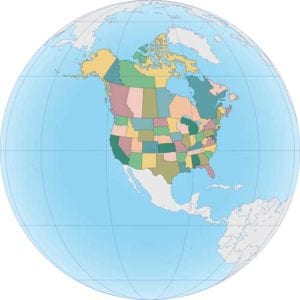
A number of countries who relied on BCBAs for treatment for autism and other related disorders will have to find another alternative.
This article explores the prevalence of autism worldwide, the lack of diagnosis and treatment options in many countries, and why the BACB decided to make the decision. The next article focuses more on what these countries can do if they are looking for alternatives.
Why is there a Growing Need for BCBAs or Alternatives Everywhere?
Autism is now understood to be a global challenge, but there is a distinct lack of people who are qualified to treat autism across the world, especially in lower and middle-income countries.
While BCBAs are just one form of treatment for people with autism, they are a very prevalent form in the U.S. that has found a lot of success and has very stringent standards for qualification. Many other specialties such as speech-language pathology and occupational therapy lack a background or specialization in autism, causing practitioners to overlook differences in perception and functioning with people with autism and impairing progress or treatment.
Many lower or middle-income countries have very little idea how prevalent autism is in their country, making it very hard for governments or professionals to know the exact needs or to be able to reach the people that need help the most. Most countries have a distinct lack of studies on autism in general, and in many cases any studies that have been conducted do not focus on the prevalence of autism. In most of these countries assessing prevalence is made very challenging by the lack of local resources for diagnosis and treatment.
While in the US autism prevalence is currently estimated to be 1 in 44 children, estimates for autism prevalence across the world are currently at a more conservative 1%. Rates may be similar to the US in many countries due to the aforementioned challenges, but that actual rates in most lower and middle-income countries are largely speculation at this point.
The Global Challenge of Autism Awareness and Treatment
In an article on the global awareness, impact and interventions for autism (emphasis ours):
“…global awareness about ASD has increased dramatically during the past decade, especially in low- and middle-income countries (LMIC). Practitioners in LMICs have only recently begun to recognize and treat ASD, considered a common developmental disorder in high income countries (HICs) (e.g., North America and Western Europe). Although global prevalence estimates for ASD are difficult to ascertain because of limited international epidemiological studies, ASD is most likely underdiagnosed in parts of the world, with individuals going undetected and without treatment.”
Treatment for Autism is a Big Obstacle in Many Countries

Autism is a growing concern across the world, but many countries have little to no options for effective treatment. Specialization and training in this area can be extremely hard for many lower and middle income countries to develop because they do not have the resources available to train people or the experienced practitioners to supervise anyone with less experience.
“The challenge of early detection and early intervention of ASD is exacerbated by limited expertise, including limited diagnostic and treatment resources in LMICs.”
Many countries have very limited social resources available for helping with treatment, social stigmas that create challenges for families to get effective treatment, limited local expertise, psychiatric care that is separate from regular health systems, and other challenges that lead to later diagnosis (if at all). To add to those challenges, often treatment is simply psychoactive medications, which may reduce some symptoms but are typically not helpful for the child in the longer term and can often become a large financial burden for the parents over time in LMICs.
“In South Africa, intervention services and specialized schools are insufficient and overwhelmed; multilingual standardized assessment tools are limited; and expertise across health care, mental health, social service and educational systems is limited (S. Malcolm-Smith).”
Is Autism and Autism Treatment the Same Across Countries?
The short answer is yes, autism is very similar across countries. However, it is important to meld effective treatment to cultural norms to get the best results.
This is actually something that has always been somewhat of a challenge for ABA therapy due to the way that BCBAs are all held to the exact same standards regardless of country, even when social norms may be very different from the U.S. where those norms were established.
As stated in the study by by Rubin and Gary (emphasis ours):
“Many clinical features of ASD are universal…the presence and severity of challenging behaviors in individuals with ASD are similar across countries. When planning effective interventions globally, researchers suggest that many evidence-based interventions developed in HICs can be modified for implementation in LMICs only when local cultural, linguistic and sociopolitical considerations are acknowledged and incorporated. Specifically, assessment tools and intervention services to be effective in diverse environments, must be adapted to align with the local cultural and linguistic needs, sociopolitical environment, resources and barriers experienced by families and professionals in each LMIC. For instance, in countries in which multigenerations typically reside together, practitioners are advised to use cultural and familial sensitivity and include extended family members in “parental” intervention training sessions to assist with implementing the interventions and providing support.”
Each individual with autism is different no matter what country they reside in, and it turns out that the exact approach to treatment in each country might have to include such variances in treatments as well.
However, even when accounting for societal differences, the underlying principles of treatment are still going to be based on the same foundations. Applied Behavior Analysis (ABA) therapy is only one type of therapy that can be used with autism. Regardless of the type of therapy used it is important that practitioners understand how people with autism respond differently to many common approaches such as positive reinforcement.
Without this understanding treatment will undoubtedly lead to frustration for both the student and the teacher or therapist, and these understandings significantly reducing the outcomes achieved through therapy.
If there is such a huge need for treatment in autism, why did the BACB stop certifying new applicants outside the United States and Canada?
Why BCBAs Are Not Being Certified Outside the U.S. and Canada
 The need for qualified professionals across the world to treat autism is growing steadily. The BACB has always faced numerous challenges to maintain their rigorous standards for professionals across nations, and they have decided it stretches their resources too thin to maintain international certifications.
The need for qualified professionals across the world to treat autism is growing steadily. The BACB has always faced numerous challenges to maintain their rigorous standards for professionals across nations, and they have decided it stretches their resources too thin to maintain international certifications.
This comes at a time when international awareness has grown substantially and the need for autism services is steadily growing, but many challenges remain for achieving consistency internationally whether it be in ABA or any other form of treatment for autism.
Currently there are 112,264 BACB certificants globally (37,859 BCBAs, 4,044 BCaBAs, and 70,361 RBTs), yet 94.4% reside in the United States.
Only 1.9% live in Canada and 3.7% in all other countries. There are about 1,800 BCBAs and RBTs in all other countries and about 500 BCaBAs.
While there are BACB certificants living in 94 countries besides the U.S. and Canada, only three of these countries have more than 100 BCBAs residing there. These include the United Kingdom with 364 certificants, Italy with 185, and Ireland with 156. Of the 94 countries, 67 have less than 10 BCBAs residing there.
When Can BCBAs no Longer be Certified Outside the U.S. and Canada?
On December 30, 2019 the Behavior Analyst Certification Board (BACB) announced that starting January 1, 2023 they will no longer be accepting applications from individuals who live outside of the U.S. and Canada. For those who earn the certification before January 1, 2023 they will be able to receive their certification in perpetuity.
Global Requirements are no Longer Viable for BACB
Most other major industries and professions, such as psychology, medicine, and accounting, have country-specific requirements as the norm rather than global requirements. After extensive research and consultation with experts in certification and testing over multiple years, the BACB has concluded that upholding global requirements is no longer a feasible practice.
Language Barriers a Big Impediment to Maintaining International Certification
A major component that the BACB has had to consider is the issue regarding language barriers.
Since international certification involves much more than solely the initial assessment, language and translation is something that plays an important role in getting the correct information to all applicants and certificants. If everyone does not have access to the same information, this creates an unfair learning environment.
To effectively offer certification globally, the BACB would need to translate the following into every language of every applicant and certificant: their entire website, all documents, newsletters, and mass email communications, the individual’s online account, all phone and email-based customer service and all other online materials.
International Cooperation and Standards Take Significant Effort
Another challenge is due to the volatile nature of international trade restrictions that impact many different countries. These restrictions demand constant supervision and can lead to the disruption of potential and current certificants who reside in the impacted countries.
On top of this, global certification programs also require the following information that comes directly from the BACB (emphasis ours):
- “The ability to ensure that its eligibility and maintenance requirements are legally defensible in each country, its intellectual property and trademarks can be adequately protected in each country, its fee activity is consistent with local tax laws in each country, and its ethics requirements are legally enforceable in each country.”
- “The existence of multiple secure testing facilities in every country. Some countries simply do not have testing facilities that meet the BACB’s security requirements.”
- “Compliance with each country’s privacy laws. Such laws have been rapidly changing in recent years.”
- “Compliance with each country’s examination–accommodations laws. The BACB’s accommodations activities have been designed to comply with the Americans with Disabilities Act and other national laws when possible. However, the sheer number of national laws concerning accommodations and the rapid pace at which they are changing have made it challenging to ensure compliance.”
- “Sufficient time to establish certification standards and achieve recognition of them in each country.”
- “The regulatory viability of the credential in each country. Regulators may be disinclined to recognize standards that are not necessarily specific to their country and its practices. This is perhaps the greatest barrier to globalization of a profession.”
Clearly there are a lot of nuances to make all these things happen in each country. It isn’t as simple as just translating a few documents and web resources into the local language.
One of the biggest challenges is that this is an ongoing process for each country, requiring resources to maintain these standards in each country. Hence it makes sense why the BACB is only looking to maintain credentialing in countries that are actively interested in working with them.
Meeting Accreditation Standards-
While evaluating the feasibility of maintaining international certification, the BACB had to consider accreditation standards.
The BACB accredits the BCBA, BCaBA, and RBT certification programs by the National Commission for Certifying Agencies (NCCA). The BACB accreditation requires that the BACB operates consistently with testing, certification, and legal standards that are widely in the U.S. and Canada. According to the BACB, “an overarching accreditation standard is that certification requirements be consistent, regardless of location”. The challenge is that these standards block the BACB from making changes to the certification program on a county-specific basis.
While in some countries, these certification requirements and legal standards might work just fine and would fit into pre-existing regulations, in other countries this is not the case. The BACB raises the issue that while they have involved experts from outside the U.S. within their requirements committees, modifications to the requirements have mainly been based on U.S. and Canadian environments. The BACB feels it is essential to give other countries adequate time to further establish and clarify their certification standards.
To further illustrate this, the initial requirements for BCBA certification were introduced in 1998 and were broad due to the infrastructure of the U.S. at that time. These requirements included 180 hours of graduate instruction in behavior analysis and 18 months of practical experience in the field. Just as the U.S. environment has evolved drastically since 1998, it is only logical that some countries will also require time to develop their own entry-level requirements.
The BACB also states that some of their ethics requirements have been noted as insensitive to practice across cultures and is encouraging individual countries to establish their own ethics requirements that will be appropriate within the country’s culture.
Something else for those interested in pursuing their BCBA certification should consider is the challenge of behavior analysts being unable to practice their profession. This is mainly due to issues raised by professional organizations and governmental and legislative bodies.
What Now? Are there Options through BACB?
The BACB does state that a national behavior analysis organization does have the option of formally requesting that new BACB certifications be made available in their country after December 31, 2022. However, the application is extensive and time-consuming, requiring the following: “a comprehensive assessment of the professional landscape within the target country (conducted by the applicant); a thorough analysis of testing capacity; and analysis of trademark, tax, and trade laws (conducted by the BACB)”.
After review of the application, it is up to the BACB Board of Directors to either approve or decline so there is no guarantee that the organization will be able to have the new BACB certifications available in their country. It will operate on a case-by-case basis.
Other Opportunities Outside BCBA certification
While BCBAs can work in many environments, if you are considering becoming a BCBA, it is important to understand that the majority of BCBAs are highly focused on working with individuals who have been diagnosed with Autism Spectrum Disorder (ASD). In fact, the Association for Behavior Analysis International (ABAI) sponsors an annual conference that is solely focused on autism. The majority of presenters at the convention speak on the same topic.
With international certification no longer available for BCBAs and their current profession is already highly dedicated to autism, this leaves many countries in a hard spot when it comes to finding qualified practitioners to work with people on the autism spectrum.
Autism Certification can Help Practitioners Better Serve People with Autism
One of the biggest challenges with autism is the way that people on the spectrum tend to respond differently to many therapy techniques such as positive reinforcement. Getting a specialized credential in autism can help therapists, healthcare providers, and educators of all types to be able to better understand people on the autism spectrum, leading to better outcomes.
While these autism credentials are typically meant for therapists and those in a professional setting, in many countries where services are more limited it may also make sense for parents to go through certification to learn to better help their child.
Board Certified Behavior Analysts go through extensive coursework and training to become proficient in treating people with autism through ABA therapy, while the different tracks to become a Certified Autism Specialist™ credential allow therapists, healthcare providers, or teachers to add autism to their areas of expertise.
This circumvents a number of the challenges associated with international accreditation by allowing people who become therapists, healthcare professionals or educators in their own countries to go through local training and incorporate local norms while also gaining a much needed specialized understanding in autism.
As a professional credential, the Certified Autism Specialist (14 credit hours) or the Advanced Certified Autism Specialist (21 credit hours, includes ABA related training as well) are able to help these workers get recognized for extra expertise in the area of autism.
To learn more about the differences and what these two credentials have to offer take a look at our article comparing the CAS and the ACAS as alternative to a BCBA.
Learn More About Our Certification Options
JUN